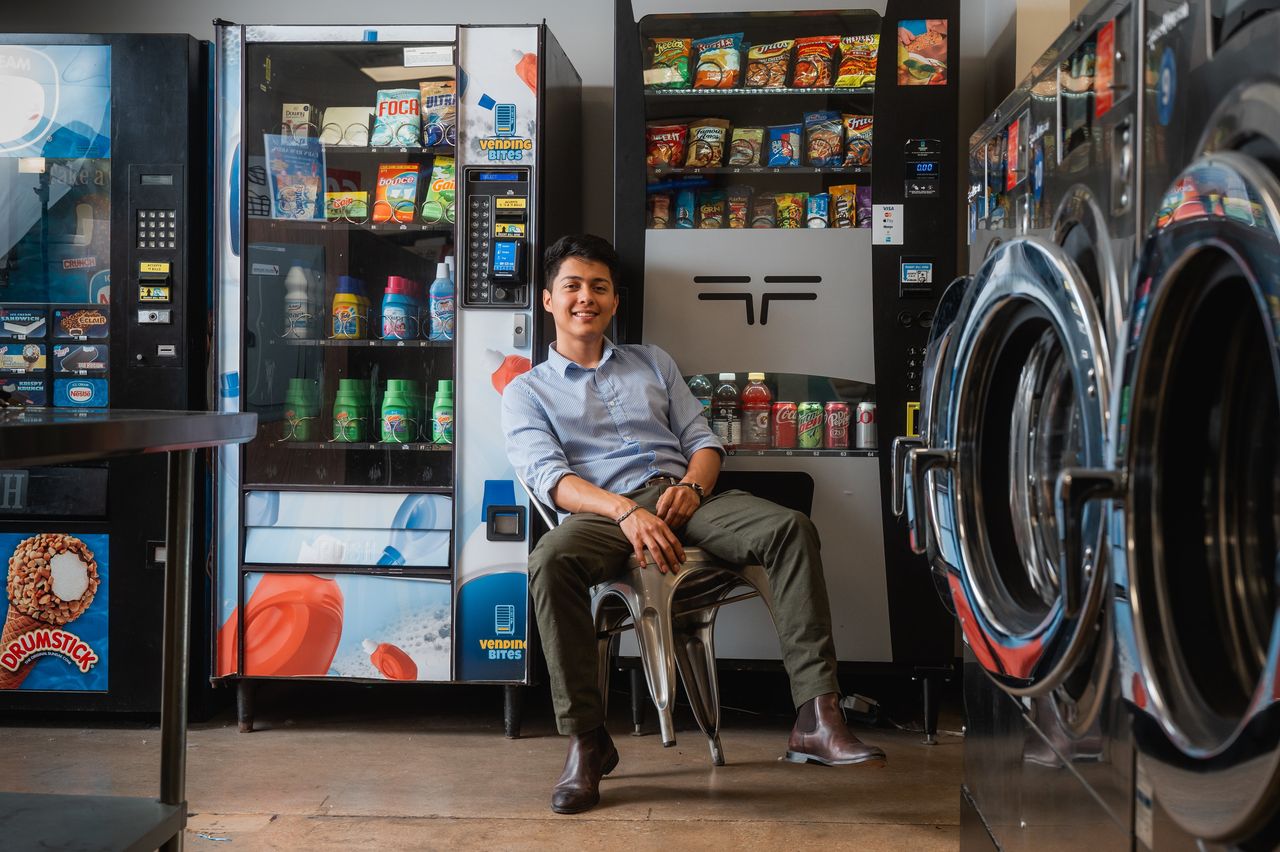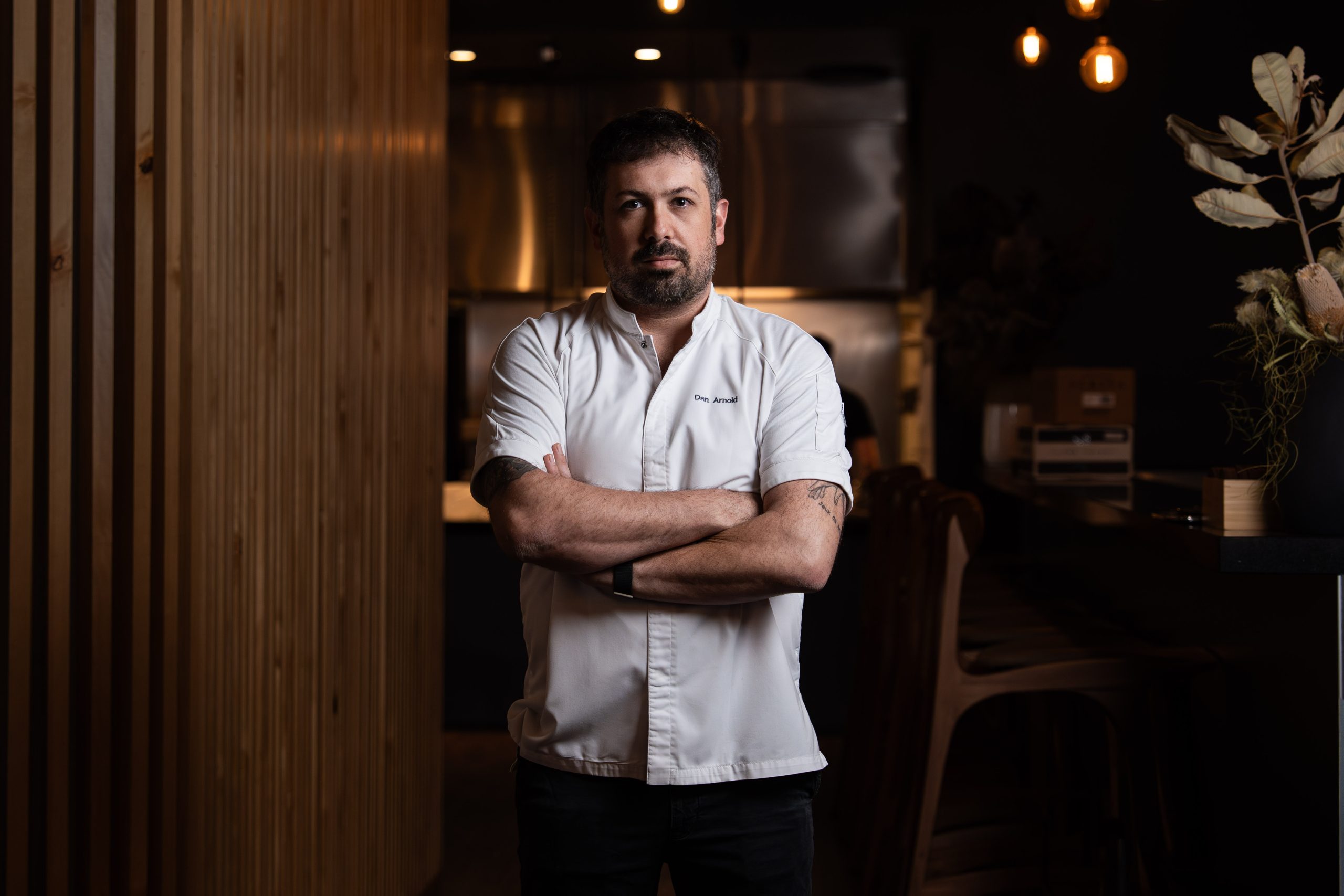Chasing Passive Income, Americans Turn to Vending Machines
How candy and soda machines became an unlikely trending investment idea of the 2020s
With a brick of cash in his hand and a grin on his face, Jaime Ibanez shows his half-million YouTube subscribers a path to earning money without burning many calories: Vending machines.
In videos with titles such as “This Is HOW MUCH My Vending Machines Made IN 7 DAYS!!” the swoopy-haired 23-year-old Texan makes the rounds to his 51 machines, stocking them and taking the profits.
His channel promotes the idea that with diligence and luck, anyone can go from snacks to riches.
Vending machines might seem an unlikely candidate for trending investment of the 2020s, but the idea has captured the imagination of Americans dreaming of easier money. Some pursue chips and soda as a side hustle because their regular paychecks aren’t enough for them to get by. Others bet on vending machines as a ticket to upward mobility, to quitting their jobs and becoming their own boss.
The startup cost is low and the formula simple. Buy a used machine for $1,500, load it up with products from Costco , charge a 100% markup and let the crinkled dollars roll in. But turning a profit takes real work, and the machines can be a losing proposition when stuck in locations without enough hungry foot traffic.
There is a fair amount of competition, too. America has three million vending machines, an $18.2 billion industry, with the average machine generating about $525 in monthly revenue, according to the National Automatic Merchandising Association.
More than half of operators bring in less than $1 million a year, according to trade publication Automatic Merchandiser. Many are individuals who have other jobs.
Social media has fuelled the notion of finding financial freedom in vending machines. Between 2019 and 2023, the number of posts or comments mentioning passive income and vending machines more than tripled on X and increased by a factor of six on Instagram, according to Sprinklr, a social-media management platform. Google search interest in passive income increased some 75% during that same period.
“There’s a real sense that doing things the so-called right way won’t necessarily land you in the middle class,” said Lana Swartz, a media-studies professor at the University of Virginia who researches financial technologies. “If the old rules no longer apply, then there’s a searching for new rules to get ahead or to get by.”
Some vending-machine newbies say they are on their way to building an automated empire. Others’ dreams get snagged like a bag of Funyuns on a faulty coil.
Making sales while you sleep
Last spring Rob Smith, a 30-year-old truck driver in Orlando, Fla., spent $4,000 on his first machine, a credit-card reader and a load of snacks and drinks.
He recently acquired his fourth machine, which is at an industrial bakery. His first three machines take up three to five hours of his week and bring in about $1,500 a month in revenue, which works out to roughly $750 in profit.
“I’ve made sales at four o’clock in the morning, when I was sleeping,” he said. “That machine is still working whether I’m there or not.”
He hopes to scale up to 30 machines and quit his job.
Smith started looking for extra income because his goal of buying a house felt out of reach with only his day job’s pay. He chose vending specifically after he witnessed a colleague complain about a malfunctioning machine at work and then use it anyway.
“He still put his $2 in,” Smith said. “I was like, ‘I need to get a vending machine as soon as possible.’ ”
Some budding vendors pay $300 or more for online courses to learn the trade. Smith relied on YouTube, Instagram and Reddit to get going.
At one point, he stocked a machine with orange soda against the advice he got in an online forum. When it didn’t sell, he and his family had to drink three dozen cans themselves.
Empty calories
Tom and Missi Hakes of Midway, Ala., started vending after Missi, 40, saw videos on YouTube about the business. The idea seemed more appealing than their stints driving for Uber, shopping for Instacart and trying to make it as YouTubers.
The Hakes, who both have full-time jobs in health insurance, scouted out locations in Atlanta, the closest big city and two hours away. After their best lead fell through, they paid a woman they found on Facebook Marketplace $500 to find a location for them.
She sent them to two spots that didn’t work out, including a cheerleading gym. The manager there was on board until she learned that the Hakes hadn’t operated a vending machine before.
Tom, 48, posted on a forum wondering how to address questions about their industry experience. At their next meeting, with the owner of a gym, they reluctantly followed some of the forum’s advice: They lied and said they had a few machines.
“We didn’t want to get another no,” said Tom.
He then spent a month repairing a used machine they bought for $1,400, staying up on some nights until 2 a.m.
When it was ready, Tom and Missi struggled to wrangle it into the 15-foot U-Haul truck they rented.
“Two people is not enough to move an 800-pound machine,” she said.
The Hakes spent about $2,500 on their vending business, as well as 20 to 30 hours a week for much of last fall.
They pay $50 a month to park it in the gym and it costs about $330 to fill up. It is currently grossing about $30 a week.
If anything, the income has been too passive, Tom said, “because it’s not really doing a lot of sales.”
If the machine isn’t selling more by summer, the Hakes will consider leaving the location, or perhaps vending machines overall.
Hit Facebook Marketplace, then Costco
Used vending machines of questionable quality sell online for as little as $500. More reliable ones cost in the range of $1,000 to $2,000, according to veteran vendors. A new machine with a touch screen and a robotic arm could cost upward of $7,000.
Many used machines have a maintenance issue about once a year, and they need to be cleaned. Cash is dirty, said Ben Gaskill of Everest Ice and Water Systems, a vending-machine maker. “Somebody digs around for coins in the bottom of their purse and it’s got grape jelly on it.”
Vendors shop warehouse stores like Costco and Sam’s Club to stock up. One machine’s worth of snacks or drinks can cost $200 to $300 a month. Owners then charge about twice what they paid for each product, or more. Prices of food from vending machines were up 10.6% year over year in January, according to Labor Department data.
The top-selling items in vending machines are cold drinks, snacks and candy, according to the latest data from Automatic Merchandiser magazine.
“No matter how healthy you try to make the machines, people are going to buy that Snickers bar,” said Lory Strickland, who sells courses and one-on-one coaching with her husband, Barry, under the name The Vending Mentors.
A never-vending story
Selling online classes and coaching can sometimes be more lucrative than a given moneymaking idea itself, said Swartz, the University of Virginia professor.
In online forums, she said, “there’s the joke that if there are people making courses about it, then it’s already oversaturated as a side hustle.”
To capitalise on interest in vending, some experienced operators started selling their expertise to supplement the income coming in from their machines. Some transitioned primarily to training.
Hyping the vending-machine dream predates the internet, though. The first machines in the U.S. sold gum and appeared on train platforms in 1888.
In the 1940s, media outlets cautioned about “get-rich-quick schemes” promoted by “unscrupulous agents involving vending machines.” In 1960, the magazine now known as Kiplinger Personal Finance warned of “vultures in the business” who promised “that an $800 investment may produce $200 a month, and that only a few hours of work a week are required to enjoy such rich pickings.”
 Copyright 2020, Dow Jones & Company, Inc. All Rights Reserved Worldwide. LEARN MORE
Copyright 2020, Dow Jones & Company, Inc. All Rights Reserved Worldwide. LEARN MORE
Australia’s housing market defies forecasts as prices surge past pandemic-era benchmarks.
Records keep falling in 2025 as harbourfront, beachfront and blue-chip estates crowd the top of the market.
JPMorgan Chase has a ‘strong bias’ against adding staff, while Walmart is keeping its head count flat. Major employers are in a new, ultra lean era.
It’s the corporate gamble of the moment: Can you run a company, increasing sales and juicing profits, without adding people?
American employers are increasingly making the calculation that they can keep the size of their teams flat—or shrink through layoffs—without harming their businesses.
Part of that thinking is the belief that artificial intelligence will be used to pick up some of the slack and automate more processes. Companies are also hesitant to make any moves in an economy many still describe as uncertain.
JPMorgan Chase’s chief financial officer told investors recently that the bank now has a “very strong bias against having the reflective response” to hire more people for any given need. Aerospace and defense company RTX boasted last week that its sales rose even without adding employees.
Goldman Sachs , meanwhile, sent a memo to staffers this month saying the firm “will constrain head count growth through the end of the year” and reduce roles that could be more efficient with AI. Walmart , the nation’s largest private employer, also said it plans to keep its head count roughly flat over the next three years, even as its sales grow.
“If people are getting more productive, you don’t need to hire more people,” Brian Chesky , Airbnb’s chief executive, said in an interview. “I see a lot of companies pre-emptively holding the line, forecasting and hoping that they can have smaller workforces.”
Airbnb employs around 7,000 people, and Chesky says he doesn’t expect that number to grow much over the next year. With the help of AI, he said he hopes that “the team we already have can get considerably more work done.”
Many companies seem intent on embracing a new, ultralean model of staffing, one where more roles are kept unfilled and hiring is treated as a last resort. At Intuit , every time a job comes open, managers are pushed to justify why they need to backfill it, said Sandeep Aujla , the company’s chief financial officer. The new rigor around hiring helps combat corporate bloat.
“That typical behavior that settles in—and we’re all guilty of it—is, historically, if someone leaves, if Jane Doe leaves, I’ve got to backfill Jane,” Aujla said in an interview. Now, when someone quits, the company asks: “Is there an opportunity for us to rethink how we staff?”
Intuit has chosen not to replace certain roles in its finance, legal and customer-support functions, he said. In its last fiscal year, the company’s revenue rose 16% even as its head count stayed flat, and it is planning only modest hiring in the current year.
The desire to avoid hiring or filling jobs reflects a growing push among executives to see a return on their AI spending. On earnings calls, mentions of ROI and AI investments are increasing, according to an analysis by AlphaSense, reflecting heightened interest from analysts and investors that companies make good on the millions they are pouring into AI.
Many executives hope that software coding assistants and armies of digital agents will keep improving—even if the current results still at times leave something to be desired.
The widespread caution in hiring now is frustrating job seekers and leading many employees within organizations to feel stuck in place, unable to ascend or take on new roles, workers and bosses say.
Inside many large companies, HR chiefs also say it is becoming increasingly difficult to predict just how many employees will be needed as technology takes on more of the work.
Some employers seem to think that fewer employees will actually improve operations.
Meta Platforms this past week said it is cutting 600 jobs in its AI division, a move some leaders hailed as a way to cut down on bureaucracy.
“By reducing the size of our team, fewer conversations will be required to make a decision, and each person will be more load-bearing and have more scope and impact,” Alexandr Wang , Meta’s chief AI officer, wrote in a memo to staff seen by The Wall Street Journal.
Though layoffs haven’t been widespread through the economy, some companies are making cuts. Target on Thursday said it would cut about 1,000 corporate employees, and close another 800 open positions, totaling around 8% of its corporate workforce. Michael Fiddelke , Target’s incoming CEO, said in a memo sent to staff that too “many layers and overlapping work have slowed decisions, making it harder to bring ideas to life.”
A range of other employers, from the electric-truck maker Rivian to cable and broadband provider Charter Communications , have announced their own staff cuts in recent weeks, too.
Operating with fewer people can still pose risks for companies by straining existing staffers or hurting efforts to develop future leaders, executives and economists say. “It’s a bit of a double-edged sword,” said Matthew Martin , senior U.S. economist at Oxford Economics. “You want to keep your head count costs down now—but you also have to have an eye on the future.”
Now complete, Ophora at Tallawong offers luxury finishes, 10-year defect insurance and standout value from $475,000.
On October 2, acclaimed chef Dan Arnold will host an exclusive evening, unveiling a Michelin-inspired menu in a rare masterclass of food, storytelling and flavour.
























